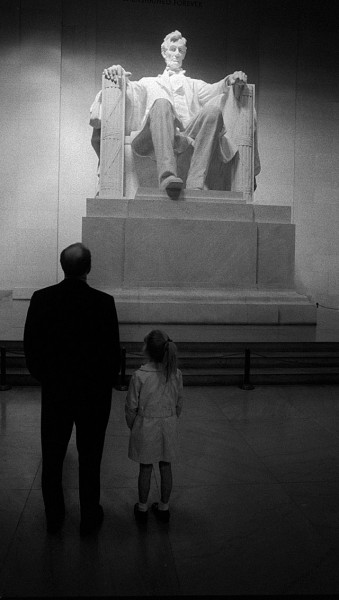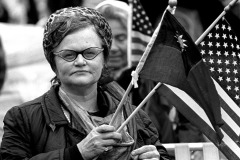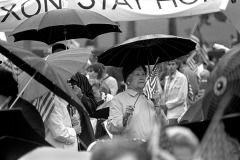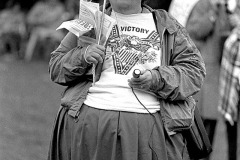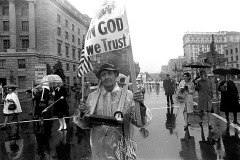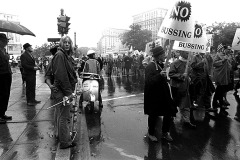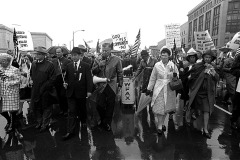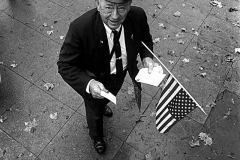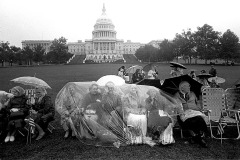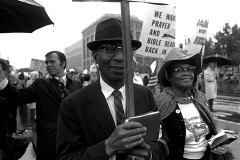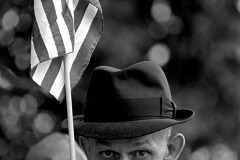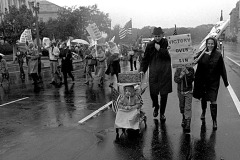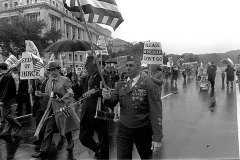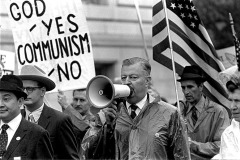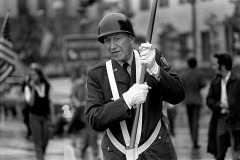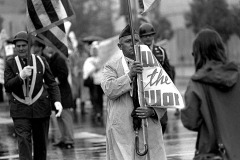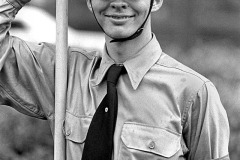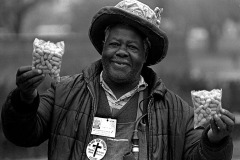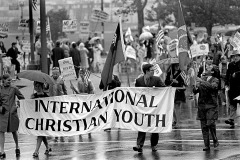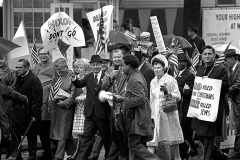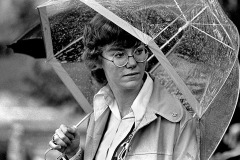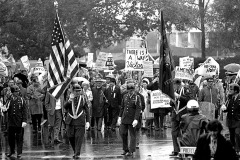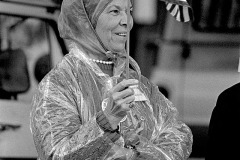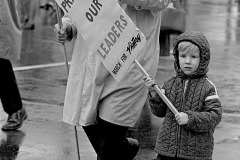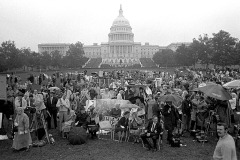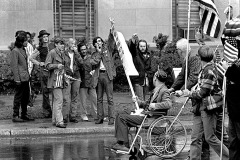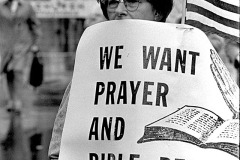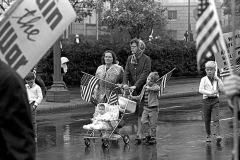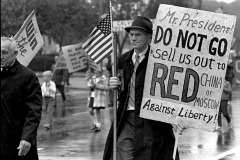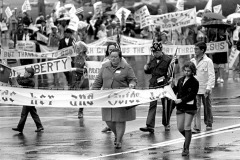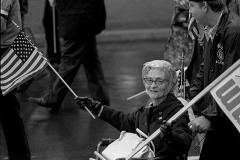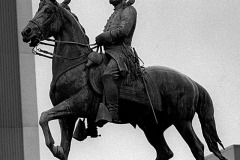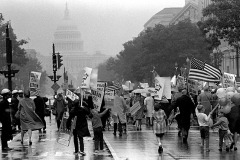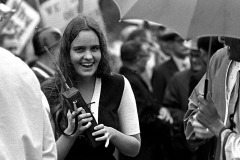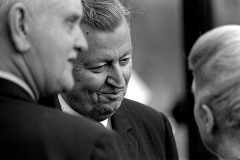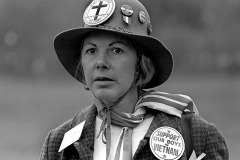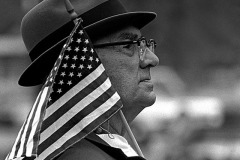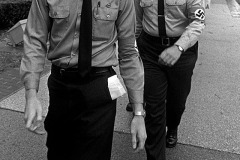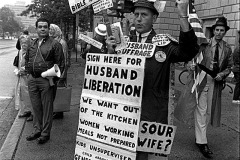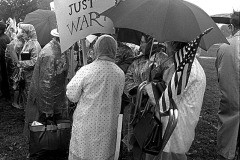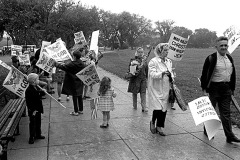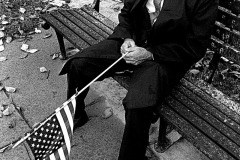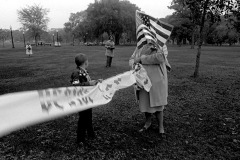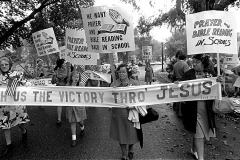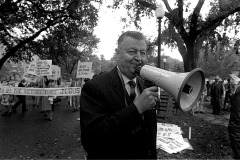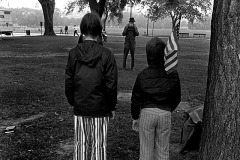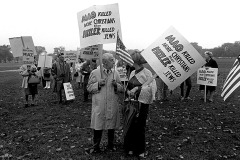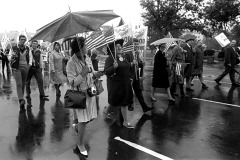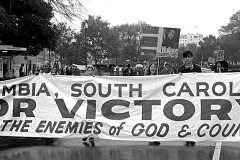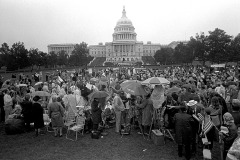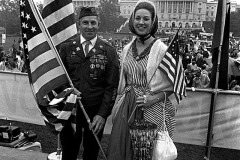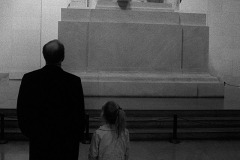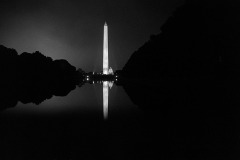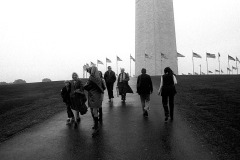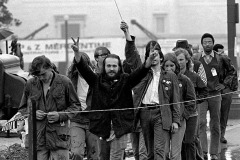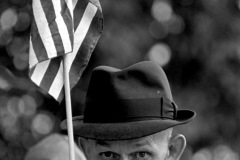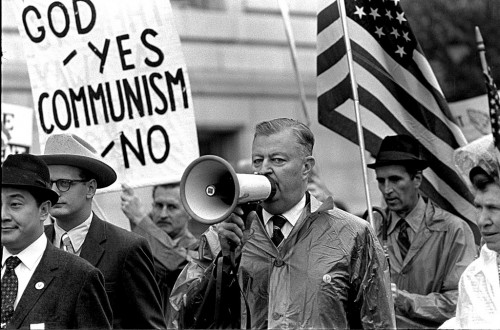 Glenn Beck and his “Restoring Honor” rally, held on the same stage where Dr. Martin Luther King delivered his “I Have a Dream” speech 47 years to the day, takes me back to an earlier conservative firebrand, Carl McIntire.
Glenn Beck and his “Restoring Honor” rally, held on the same stage where Dr. Martin Luther King delivered his “I Have a Dream” speech 47 years to the day, takes me back to an earlier conservative firebrand, Carl McIntire.
[Editor’s note: in case the search engines bring in some folks who don’t normally hang out here, this is a non-political blog dealing with coming of age in a small town in the Midwest in the 60s. Freedom of the Press belongs to he who has one, so I reserve the right to close out comments that produce more heat than light. I’m departing from normal Cape content just because I like some of these pictures and they’re topical.]
How we ended up at a Pro-Viet Nam War march
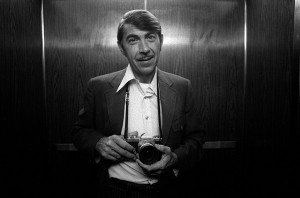 I was working as chief photographer for The Gastonia (N.C.) Gazette in the early 70s. When I took the job, I was in my early 20s (VERY early 20s) and wasn’t sure how I was going to deal with a inheriting a staff that had a photographer on it who was more than twice my age and had had no formal training.
I was working as chief photographer for The Gastonia (N.C.) Gazette in the early 70s. When I took the job, I was in my early 20s (VERY early 20s) and wasn’t sure how I was going to deal with a inheriting a staff that had a photographer on it who was more than twice my age and had had no formal training.
As it turned out, Kermit not only didn’t resent some young Yankee whippersnapper coming in, he welcomed the chance to learn new skills. As a reward, I took him with me to a photojournalism conference in Washington, D.C. I don’t think either of us had been to D.C. before, so we were pretty much the tourists.
I spotted a newspaper story that said that some preacher named Carl McIntire was going to lead a Pro-Viet Nam “Victory March” down to the Capitol. I had covered plenty of anti-war protests, so I thought this would be a change, and definitely a new experience for Kermit.
The Washington March started in the rain
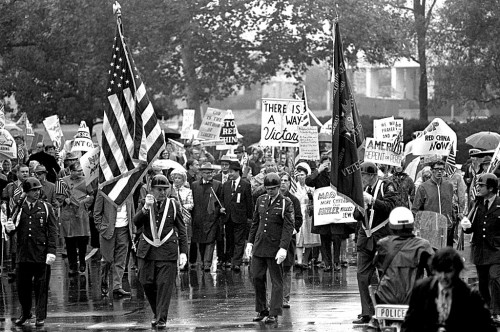 October 24, 1971, was a chilly, rainy, miserable day for a demonstration, but a fair number of people showed up to march. McIntire organized about half of dozen of these marches in the early 70s. One account said that as many as 14,000 people showed up for one of them. This one might have attracted a couple thousand, at most.
October 24, 1971, was a chilly, rainy, miserable day for a demonstration, but a fair number of people showed up to march. McIntire organized about half of dozen of these marches in the early 70s. One account said that as many as 14,000 people showed up for one of them. This one might have attracted a couple thousand, at most.
Harry Britton, Husband’s Lib advocate
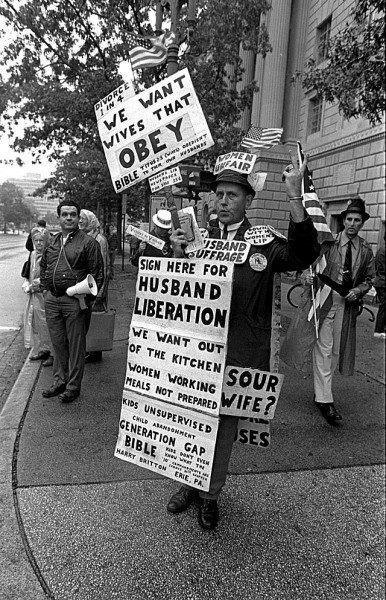 To be fair, Harry Britton of Erie, PA, wasn’t actually part of the march; he was just along the route. New York Magazine wrote that he was a fixture who had been supporting himself wearing placards, carrying signs and selling his leaflets for 25 cents each for several years. “Harry makes only $2,000 a year. He’s not in this for the money, though; he says his only goal is reconciliation with his wife, from whom he is, not surprisingly, separated.”
To be fair, Harry Britton of Erie, PA, wasn’t actually part of the march; he was just along the route. New York Magazine wrote that he was a fixture who had been supporting himself wearing placards, carrying signs and selling his leaflets for 25 cents each for several years. “Harry makes only $2,000 a year. He’s not in this for the money, though; he says his only goal is reconciliation with his wife, from whom he is, not surprisingly, separated.”
Another account said he was the “president (and probably sole member) of the National Association of Dissatisfied Husbands subsisting on sales of publications extolling ‘Husband Lib.(‘It’s not men’s lib,it’s Husband Lib. The Bachelors are not oppressed yet’).”
Civility in Protest
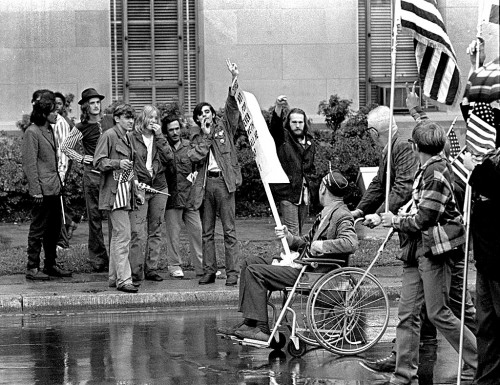 I was surprised to see the reaction of the boy carrying the flag next to the man in the wheelchair. When he passed the local hippie contingent, dressed in the standard uniform of army surplus clothing, he answered their peace sign with one of his own. Yep, BOTH fingers are showing.
I was surprised to see the reaction of the boy carrying the flag next to the man in the wheelchair. When he passed the local hippie contingent, dressed in the standard uniform of army surplus clothing, he answered their peace sign with one of his own. Yep, BOTH fingers are showing.
McIntire: “Fundamentalist with a flair”
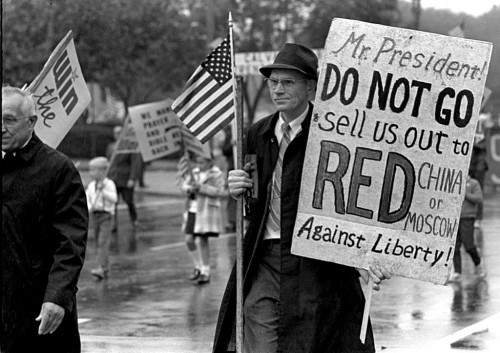 Many of the marchers were protesting President Nixon’s overtures to the Chinese.
Many of the marchers were protesting President Nixon’s overtures to the Chinese.
Christianity Today described Carl McIntire as a “fundamentalist with a flair.”
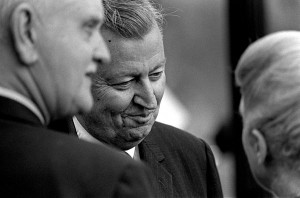 The story continued, “Throughout his career, McIntire was a tireless crusader against communists, whom he suspected of lurking everywhere, from mainline Protestantism to the Public Broadcasting System (PBS); he cooperated with the staff of Senator Joseph McCarthy in the late 1940s and early 1950s. Over the years, McIntire expanded his list of enemies to include Billy Graham, Oral Roberts, Martin Luther King Jr., antiwar protesters, feminists, the U.S. Postal Service, and the Revised Standard Version of the Bible, among many others.”
The story continued, “Throughout his career, McIntire was a tireless crusader against communists, whom he suspected of lurking everywhere, from mainline Protestantism to the Public Broadcasting System (PBS); he cooperated with the staff of Senator Joseph McCarthy in the late 1940s and early 1950s. Over the years, McIntire expanded his list of enemies to include Billy Graham, Oral Roberts, Martin Luther King Jr., antiwar protesters, feminists, the U.S. Postal Service, and the Revised Standard Version of the Bible, among many others.”
McIntire challenged Fairness Doctrine
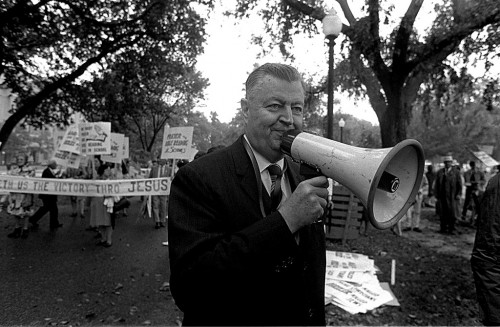 Never one to run from a fight, McIntire ran afoul of the FCC’s Fairness Doctrine when he refused to allow dissenting views to run on his radio show, The Twentieth Century Reformation Hour. The program was heard on as many as 600 stations (depending on your source).
Never one to run from a fight, McIntire ran afoul of the FCC’s Fairness Doctrine when he refused to allow dissenting views to run on his radio show, The Twentieth Century Reformation Hour. The program was heard on as many as 600 stations (depending on your source).
When the FCC refused to renew McIntire’s radio station license in 1973, he came up with Plan B. He fitted a wooden World War II era mine sweeper with a radio transmitter and sailed it out beyond the three-mile limit near Cape May.
Radio Free America
“Radio Free America” broadcast for just ten hours. He was shut down because he was interfering with a commercial radio station on an adjacent frequency. (A more interesting version has the broadcast coming to end end because the overheated antenna feed line started to catch the wooden vessel on fire.)
This is a man who doesn’t Tweet
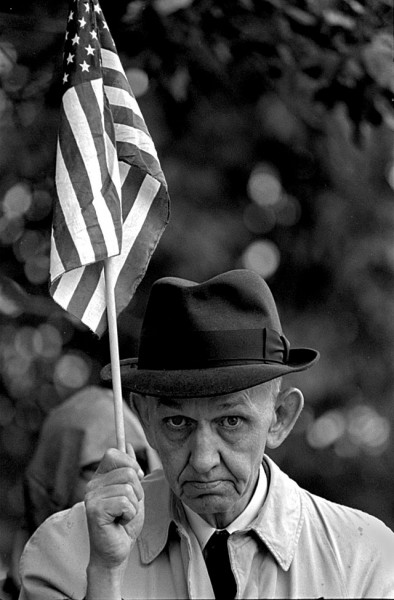 Shooting photos of strange-looking people at demonstrations is like shooting fish in a barrel. I would rather photograph someone with substance, like this man. (That’s not to say that I didn’t include some rather odd-looking folks in the gallery.)
Shooting photos of strange-looking people at demonstrations is like shooting fish in a barrel. I would rather photograph someone with substance, like this man. (That’s not to say that I didn’t include some rather odd-looking folks in the gallery.)
I’ve always liked the quiet dignity projected by this man. I don’t know what his beliefs were, and I am not sure if I’d agree with them, but I respected the calm way he returned my gaze.
Blacks marching for prayer in school
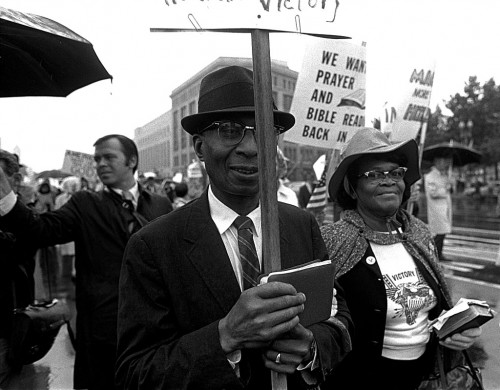 Most of the participants were white, older folks, but a number of blacks marched to support prayer and Bible reading in school.
Most of the participants were white, older folks, but a number of blacks marched to support prayer and Bible reading in school.
Whites oppose “bussing”
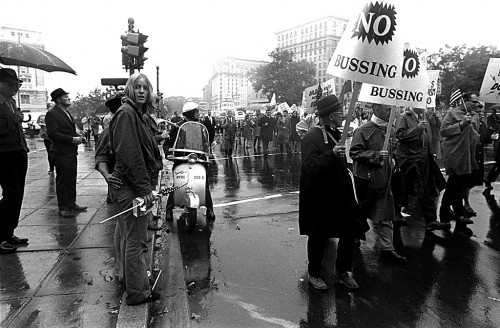 McIntire opposed the civil rights movement. His supporters carried signs opposing “bussing.” That’s a little confusing, because “busing” is when you put students on a bus to take them to school. “Bussing” is kissing, according to the AP Stylebook.
McIntire opposed the civil rights movement. His supporters carried signs opposing “bussing.” That’s a little confusing, because “busing” is when you put students on a bus to take them to school. “Bussing” is kissing, according to the AP Stylebook.
So, I’m not sure if they are opposing kissing (likely) or a transportation system (also likely).
Capitol makes picture-perfect background
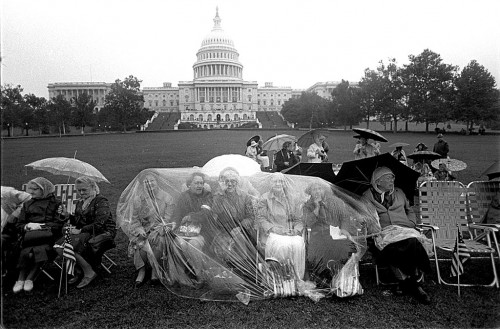 These folks were prepared for bad weather. I like the friendly wave from the woman in the middle.
These folks were prepared for bad weather. I like the friendly wave from the woman in the middle.
Then, the Victory March was over
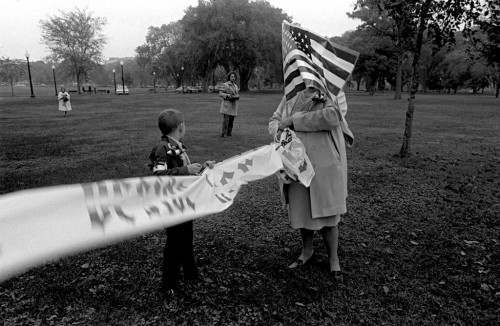 McIntire continued to hold his Victory Marches until 1972.
McIntire continued to hold his Victory Marches until 1972.
On April 30, 1975, at 8:35 a.m., the last Americans, ten Marines from the embassy, departed Saigon, concluding the U.S. presence in Vietnam.
King to McIntire to Beck
What do Martin Luther King, Carl McIntire and Glenn Beck have in common?
They all have the right to say their piece in the shadow of Abraham Lincoln.
Washington Memorial
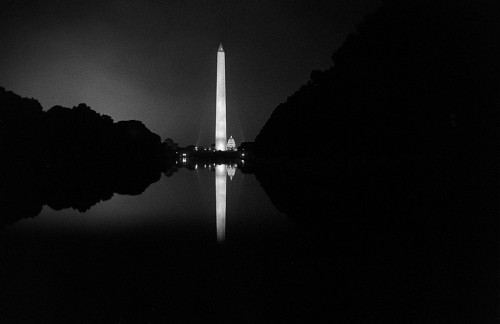 Victory March Photo Gallery
Victory March Photo Gallery
I tried to treat everyone with respect, even if I found their views repugnant. I hope that comes across in this photo gallery. Click on any image to make it larger, then click on the left or right side to move through the gallery.

